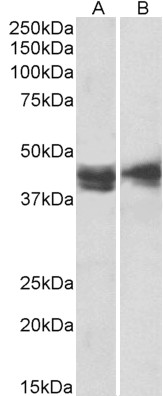Goat Anti-IL3RA / CD123 Antibody (internal region)
Purified Goat Polyclonal Antibody
- SPECIFICATION
- CITATIONS
- PROTOCOLS
- BACKGROUND

Application
| WB, E |
|---|---|
| Primary Accession | P26951 |
| Other Accession | NP_002174.1, NP_001254642.1 |
| Reactivity | Human |
| Predicted | Human |
| Host | Goat |
| Clonality | Polyclonal |
| Concentration | 0.5 |
| Calculated MW | 43330 Da |
| Gene ID | 3563 |
|---|---|
| Other Names | IL3RA; interleukin 3 receptor, alpha (low affinity); CD123; IL3R; IL3RAY; IL3RX; IL3RY; hIL-3Ra; CD123 antigen; IL-3 receptor alpha SP2 isoform; IL-3 receptor subunit alpha; IL-3R subunit alpha; IL-3R-alpha; IL-3RA; interleukin-3 receptor subunit alpha |
| Dilution | WB~~1:1000 E~~N/A |
| Format | Supplied at 0.5 mg/ml in Tris saline, 0.02% sodium azide, pH7.3 with 0.5% bovine serum albumin. Aliquot and store at -20°C. Minimize freezing and thawing. |
| Immunogen | Peptide with sequence RQQYECLHYKTD, from the internal region of the protein sequence according to NP_002174.1; NP_001254642.1. |
| Storage | Maintain refrigerated at 2-8°C for up to 6 months. For long term storage store at -20°C in small aliquots to prevent freeze-thaw cycles. |
| Precautions | Goat Anti-IL3RA / CD123 Antibody (internal region) is for research use only and not for use in diagnostic or therapeutic procedures. |
| Name | IL3RA (HGNC:6012) |
|---|---|
| Synonyms | IL3R |
| Function | Cell surface receptor for IL3 expressed on hematopoietic progenitor cells, monocytes and B-lymphocytes that controls the production and differentiation of hematopoietic progenitor cells into lineage-restricted cells (PubMed:10527461). Ligand stimulation rapidly induces hetrodimerization with IL3RB, phosphorylation and enzyme activity of effector proteins such as JAK2 and PI3K that play a role in signaling cell proliferation and differentiation. Activation of JAK2 leads to STAT5-mediated transcriptional program (By similarity). |
| Cellular Location | Cell membrane; Single-pass type I membrane protein |

Thousands of laboratories across the world have published research that depended on the performance of antibodies from Abcepta to advance their research. Check out links to articles that cite our products in major peer-reviewed journals, organized by research category.
info@abcepta.com, and receive a free "I Love Antibodies" mug.
Provided below are standard protocols that you may find useful for product applications.
References
Identification of CD123+ myeloid dendritic cells as an early-stage immature subset with strong tumoristatic potential. Shi J, Ikeda K, Maeda Y, Shinagawa K, Ohtsuka A, Yamamura H, Tanimoto M. Cancer letters 2008 Oct 270 (1): 19-29.
If you have used an Abcepta product and would like to share how it has performed, please click on the "Submit Review" button and provide the requested information. Our staff will examine and post your review and contact you if needed.
If you have any additional inquiries please email technical services at tech@abcepta.com.













 Foundational characteristics of cancer include proliferation, angiogenesis, migration, evasion of apoptosis, and cellular immortality. Find key markers for these cellular processes and antibodies to detect them.
Foundational characteristics of cancer include proliferation, angiogenesis, migration, evasion of apoptosis, and cellular immortality. Find key markers for these cellular processes and antibodies to detect them. The SUMOplot™ Analysis Program predicts and scores sumoylation sites in your protein. SUMOylation is a post-translational modification involved in various cellular processes, such as nuclear-cytosolic transport, transcriptional regulation, apoptosis, protein stability, response to stress, and progression through the cell cycle.
The SUMOplot™ Analysis Program predicts and scores sumoylation sites in your protein. SUMOylation is a post-translational modification involved in various cellular processes, such as nuclear-cytosolic transport, transcriptional regulation, apoptosis, protein stability, response to stress, and progression through the cell cycle. The Autophagy Receptor Motif Plotter predicts and scores autophagy receptor binding sites in your protein. Identifying proteins connected to this pathway is critical to understanding the role of autophagy in physiological as well as pathological processes such as development, differentiation, neurodegenerative diseases, stress, infection, and cancer.
The Autophagy Receptor Motif Plotter predicts and scores autophagy receptor binding sites in your protein. Identifying proteins connected to this pathway is critical to understanding the role of autophagy in physiological as well as pathological processes such as development, differentiation, neurodegenerative diseases, stress, infection, and cancer.


